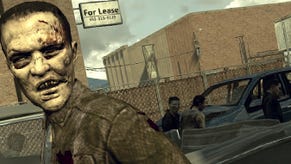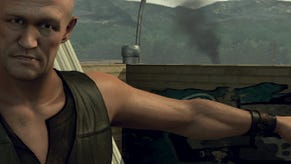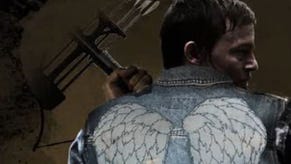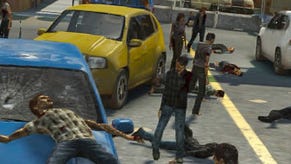Walking Dead: Survival Instinct isn't a shooter, OK?
The Walking Dead: Survival Instinct is the first-person survival horror title from Terminal Reality. VG247's Dave Cook speaks with the team to learn more about its TV adaptation.
Perception is a funny old thing. When The Walking Dead: Survival Instinct was revealed by Activision it was perceived by many gamers to be a first-person shooter.
Given the publisher's track record with pumping out Call of Duty titles, it's a natural conclusion to reach.
Yes, the game has guns - just like The Walking Dead comics and TV show have guns - but you'd have to be a bit daft to assume that Survival Instinct is just a re-skin of Black Ops 2 Zombies mode. That'd be the king of dick moves.
My real worry is that Activision and Terminal Reality haven't shown much of the game running. How are we supposed to know what kind of game it is based on teaser trailers that show next to bugger all?
Why hasn't there been more footage? If the game has triggered a backlash based on false perception, then why hasn't either party done more to separate truth from myth?
The game is out next week and I wanted answers. So in an attempt to better understand Survival Instinct's gameplay, I spoke with the studio's principal effects art and system designer Glenn Gamble.
He explained that Survival Instinct sees brothers Daryl and Merle Dixon fleeing their Georgian home and blazing a trail cross-State to a military safe zone in Atlanta City. You're free to choose your own route, but besides the sea of Walkers standing in your way, resources are your main concern.
Your car needs gas to run, so it's the backbone of Terminal Reality's scavenging mechanic. Each stage sees you fending off the undead while looking for survivors and resources to help you progress a little further. This is where things start to get interesting, but again I must make clear - I've seen none of this with my own eyes.
"If you've ever watched those Discovery Channel shows about survival, you'll know that survival is not this straight line", Gamble explained. "You have to be opportunistic, so one of the things we do in our game is - you can pick up survivors and you can have them scavenge for you when you're on your main missions.
"But what we did was made all the resources you collect – be it the weapons you carry, the food – everything you get is shared across all of the survivors. So if you get a nice fancy new shotgun, you can choose to equip it yourself or give it to one of your survivors, to aid him when he goes off on his own mission to collect – hopefully – more supplies for the group.
"If you do that he has a higher chance of coming back alive. But unfortunately because this is The Walking Dead, he may never come back and you lose that nice new shotgun that you just found."
Already I'm thinking about the new recruit missions first introduced in Assassin's Creed: Brotherhood, where Ezio would train up and send his apprentices around the world on missions. If successful they would earn the player rewards, but it was entirely possible for them to be killed in action.
The same is true here, and while you're not actively controlling the Dixon's car, you still have to decide where they go. Fail to stockpile enough gas and you could be forced to take a shorter, much deadlier route.
Much like Dragon Age: Origins, you can sometimes be attacked on the trail, triggering random "Road Event" encounters that see the brothers and their fellow survivors fending off Walkers in farms or camp sites. Saving as many people as possible is the next vital ingredient towards survival.
"You actually have to get survivors to join your group first" Gamble explained. "The survivors all have their own back-story and character, so some of them might be terrified, hiding in a boarded up gas station, and they're like, 'Dude! I haven't seen anybody in three days. I'll be glad to join you'.
"But then you have others who say, 'I'm doing just fine. You've got to prove to me that it's better for me to come with you, than it is to stay where I'm at.' So then you might have to do a mission for them. So our survivors aren't just simply plot-thin, and some of them may not join you until later in the game.
"It's this cross-cut of the different types of people you would encounter. Some have it better, some have it worse. We took those archetypes and sat down in a meeting and said, 'OK, if the Walker populace attacked tomorrow, what would we do?' Then we tried to base the characters on what our initial gut reaction was."
Unfortunately, you won't have room in your car or truck for every survivor in a level, which leads to a difficult moral choice. Do you take the weak, gibbering scaredy cat who also happens to have more resources, or do you take the battle-hardened thug with little to offer besides muscle? It's your call.
Gamble explained another type of choice that players might encounter, depending on their chosen path. Just like season two of the Walking Dead show, the brothers can become blocked by a string of abandoned cars on the freeway.
The player can choose to spend more gas on driving around the blockage, or you can get out and fight off the horde as you push the cars aside manually. Either way there appears to be more depth on offer here than the initial, first-person shooter presumption suggested.
I asked Gamble how he felt about the initial outcry over the game's reveal and he replied, "I can understand how that happened. You have Activision who is well known for Call of Duty, and then you hear , ‘Oh my God, a first-person Walking Dead game’.
“At the beginning the game just kind of announced and we didn’t really go into much detail at the time – we wanted to build up to it. I don’t understand how PR works. I actually do system design and stuff, but people have responded well to ‘talking to the dev’ kind of thing.
“I don’t know all that magic stuff, but being a gamer and somebody who actually loves gaming journalism – I’m just eating up everything that’s out there about BioShock and all the upcoming games -so I can sometimes see how those jumps in logic can happen if you just don’t have the details.”
Speaking of not having the details, I'm still concerned that little has been shown of The Walking Dead: Survival Instinct, because the concepts that Gamble explained to me sound genuinely appealing as a survival horror fan, but I must make clear that I also haven't seen them with my own eyes. The same goes for you.
Can you honestly say that you've seen enough of Survival Instinct to accurately describe it to your friends? Have you only just learned about the mechanics discussed above by reading this article? Does that make you fear for the overall quality of the game?
I wish I could tell you that Terminal Reality has created a solid tie in on par with TellTale's adventure spin-off, or that this is the title to make survival horror games on consoles scary again, but I just don't have the information to hand. That troubles me because I really should.
Don't get me wrong though, because I really do want to see Terminal Reality smash presumptions. I want them to deliver a game that really nails what it would feel like to be in The Walking Dead show, and to prove that console horror isn't just about Resident Evil 6, or other games that miss the point entirely.
Survival horror isn't just about big guns and explosions. It never was. Instead it's about genuine terror, resource management and the constant, nagging, nerve-shredding fear that comes with feeling underpowered no matter what you do.
Should the game deliver all of the above, then it would be a genuine breath of fresh air into my weary lungs. But we really need more than trailers full of cut-scenes, large flashing words and the rasp of Michael Rooker saying things to convince us otherwise.
Come next week we'll know everything.
The Walking Dead: Survival Instinct is out on PC, PS3, Xbox 360 and Wii U from March 19 in the US and March 22 across Europe.














